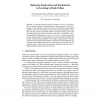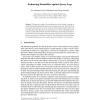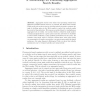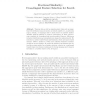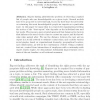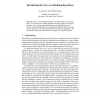138
click to vote
ECIR
2011
Springer
14 years 5 months ago
2011
Springer
Besides the content the writing style is an important discriminator in information filtering tasks. Ideally, the solution of a filtering task employs a text representation that m...
141
click to vote
ECIR
2011
Springer
14 years 5 months ago
2011
Springer
Abstract. As retrieval systems become more complex, learning to rank approaches are being developed to automatically tune their parameters. Using online learning to rank approaches...
158
click to vote
ECIR
2011
Springer
14 years 5 months ago
2011
Springer
Abstract. Quantum theory (QT) has recently been employed to advance the theory of information retrieval (IR). A typical method, namely the Quantum Probability Ranking Principle (QP...
127
click to vote
ECIR
2011
Springer
14 years 5 months ago
2011
Springer
We propose a method for search privacy on the Internet, focusing on enhancing plausible deniability against search engine query-logs. The method approximates the target search resu...
116
click to vote
ECIR
2011
Springer
14 years 5 months ago
2011
Springer
Aggregated search is the task of incorporating results from different specialized search services, or verticals, into Web search results. While most prior work focuses on deciding...
143
click to vote
ECIR
2011
Springer
14 years 5 months ago
2011
Springer
Abstract. Children experience several difficulties retrieving information using current Information Retrieval (IR) systems. Particularly, children struggle to find the right keywo...
122
click to vote
ECIR
2011
Springer
14 years 5 months ago
2011
Springer
Aggregate ranking tasks are those where documents are not the final ranking outcome, but instead an intermediary component. For instance, in expert search, a ranking of candidate ...
115
click to vote
ECIR
2011
Springer
14 years 5 months ago
2011
Springer
Abstract. Training data as well as supplementary data such as usagebased click behavior may abound in one search market (i.e., a particular region, domain, or language) and be much...
123
click to vote
ECIR
2011
Springer
14 years 5 months ago
2011
Springer
Expert finding addresses the problem of retrieving a ranked list of people who are knowledgeable on a given topic. Several models have been proposed to solve this task, but so far...
124
click to vote
ECIR
2011
Springer
14 years 5 months ago
2011
Springer
The User-over-Ranking hypothesis states that rather the user herself than a web search engine’s ranking algorithm can help to improve retrieval performance. The means are longer ...

